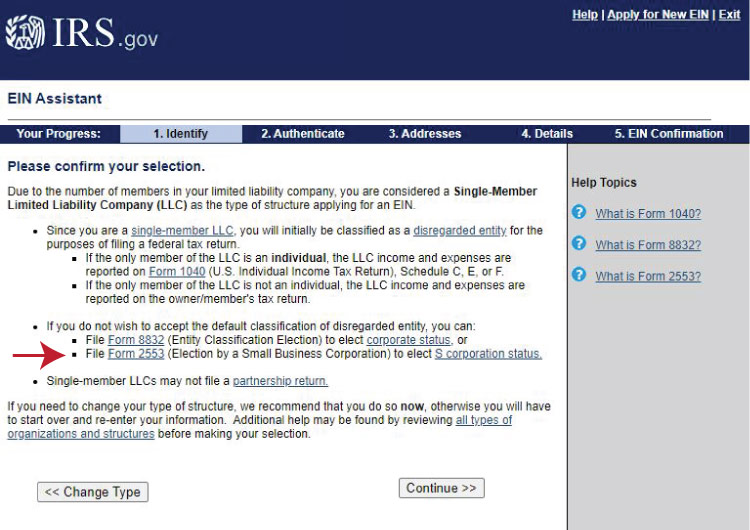How to Start an S Corp in Florida
If you’re considering starting an S corporation (S corp) in Florida, you’ve probably heard about the potential tax benefits.
We’re here to help you determine if S corp status is right for your business and guide you through the steps to start an S corp in Florida.
Keep reading to learn how to set up your Florida S corp and start saving on taxes.
Pro Tip: Get a free consultation with a tax professional to determine if an S corp is right for you.

Factors to Consider Before Starting an S Corp in Florida
Before forming a Florida S corp, you have to consider the following factors:
- Is an S corporation the best strategy for your business?
- S corporation restrictions
- Are S corp tax advantages right for you?
Is an S Corporation the Best Strategy for Your Business?
For help with choosing the right structure for your business, visit our Choosing a Business Structure guide.
S Corporation Restrictions
S corps have several restrictions, such as being limited to one class of stock and 100 shareholders. Read our What Is an S Corporation guide for full details.
Are S Corp Tax Advantages Right for You?
An S corporation is a tax designation that can be elected by a limited liability company (LLC) or corporation. With an S corp, business owners are considered employees of the company and must receive a reasonable salary. Since all S corps technically have employees, the s corp must run payroll.
In order to benefit from a Florida S corp tax designation, your business needs to make enough money to offset payroll expenses. Furthermore, S corps are beneficial for business owners who take large distributions in addition to their salary.
To learn more about the tax advantages of an S corp, read our LLC vs. S corp guide and take a look at our S Corp tax calculator.
Pro Tip: Get a free consultation with a tax professional to determine if an S corp is right for you.
How to Form a Florida S Corp
There are two main ways to start an S corp:
- By forming an LLC and electing S corp tax status from the Internal Revenue Service (IRS) when you request your employee identification number (EIN)
- By forming a corporation and electing S corp status from the IRS
We recommend forming an LLC because it’s simpler and more cost-effective.
Want to form an S corp elsewhere? Check out our other How to Start an S Corp guides to learn more.
Recommended: If you have an existing LLC, visit our How to Convert an LLC to S Corp guide.
Steps for Forming an LLC and Electing S Corp Status in Florida
Starting a Florida LLC and electing S corp tax status is easy. You can use our guides to start an LLC with the S corp status yourself, or you can hire a service provider like Northwest to guide you through this process.
There are five basic steps to start an LLC and elect S corp status:
Step 1: Name Your LLC
Step 2: Choose a Registered Agent
Step 3: File the Articles of Organization
Step 4: Create an Operating Agreement
Step 5: Get an EIN and File Form 2553 to Elect S Corp Tax Status
Step 1: Name Your LLC
Choosing a company name is the first and most important step in starting your LLC in Florida.
Be sure to choose a name that complies with Florida naming requirements and is easily searchable by potential clients.
1. Follow the naming guidelines for a Florida LLC:
- Your name must include the phrase “limited liability company” or one of its abbreviations (LLC or L.L.C.).
- Your name cannot contain language implying that the LLC is organized for an unlawful purpose or one not stated in its Articles of Organization.
- Your name cannot contain language implying that the LLC is connected with a state or federal government agency or corporation.
- Certain restricted words (e.g. Bank, Attorney, University) may require additional paperwork and a licensed individual to be part of your LLC.
- Your name must be distinguishable from any existing business in the state, except for certain fictitious name registrations, general partnership registrations, and limited liability partnership statements. Do a Florida LLC name search to determine if your name is unique.
You can also read the Florida state statute about LLC naming guidelines for more information.
2. Is the name available in Florida? You can use the Florida Secretary of State’s business entity search on the state’s SunBiz website to see if your desired LLC name is available.
3. Is the URL available? We recommend checking to see if your business name is available as a web domain. Even if you don’t plan to create a business website today, you may want to buy the URL in order to prevent others from acquiring it.
Step 2: Choose Your Florida Registered Agent
You must elect a registered agent for your Florida LLC.
An LLC registered agent will accept legal documents and tax notices on your LLC’s behalf. You will list your registered agent when you file your LLC’s Articles of Organization.
Many business owners choose to hire a registered agent service. Many of these services will form your LLC for a small fee and include the first year of registered agent services for free.
Florida Registered Agent Consent to Appointment
Registered agents in Florida must consent to their appointment by signing the Articles of Organization in written or electronic form.
The registered agent designation fee is $25.
Step 3: File the Florida LLC Articles of Organization
The Florida Articles of Organization is used to officially register an LLC.
File Your Florida Articles of Organization
OPTION 1: File Online With Florida Sunbiz
File Online– OR –
OPTION 2: File by Mail
Download FormState Filing Cost: $100, payable to the Florida Department of State (Nonrefundable)
Mailing Address:
New Filing Section
Division of Corporations
P.O. Box 6327
Tallahassee, FL 32314
Step 4: Create an LLC Operating Agreement
An LLC operating agreement is a legal document that outlines the ownership and member duties of your LLC.
For more information, read our Florida LLC Operating Agreement guide.
Our operating agreement tool is a free resource for business owners.
Step 5: Get an EIN and Complete Form 2553 on the IRS Website
An EIN is a number that is used by the US Internal Revenue Service (IRS) to identify and tax businesses. It is essentially a Social Security number for a business.
EINs are free when you apply directly with the IRS.
Elect S Corp Tax Status
During the online EIN application, the IRS will provide a link to Form 2553, the Election By a Small Business form.
Visit our Form 2553 Instructions guide for detailed help with completing the form.
This is the form to elect S corp tax status for your LLC:

Ready to start saving on your taxes?
We recommend using a formation service to start your Florida S corp for you, so you can focus on the things that matter most — growing your business.
Keep Your Florida S Corp Compliant
After forming your Florida S corp, it’s essential to stay on top of state requirements to keep your business in good standing and compliant with state laws.
File the BOI Report
The federal government mandates that all S corporations submit a Beneficial Ownership Information (BOI) report to the Financial Crimes Enforcement Network (FinCEN). This report is vital for maintaining accurate federal records of who owns and/or controls your business.
You can file the BOI report through the FinCEN website.
Maintain a Dedicated Business Bank Account
In Florida, keeping your personal and business finances separate is crucial for preserving your LLC’s liability protection. Opening a dedicated business bank account also ensures that your financial operations are organized and legally compliant.
For the best options suited to small businesses, check out our guide on the Best Banks for Small Business.
Obtain the Required Business Licenses
Operating a business in Florida requires obtaining the appropriate licenses at both the state and local levels. These licenses vary, depending on your business type and location.
To learn more about what licenses you need, visit our Florida Business License guide.
Submit Your Annual Report
Florida LLCs must file an Annual Report with the Florida Department of State to maintain their active status. This report is due between Jan. 1 and May 1 each year. Failing to file can result in penalties and even the dissolution of your S corp.
You can file your Annual Report online via the Florida Department of State’s website.
Understand Florida’s S Corp Tax Obligations
Florida imposes a state corporate income tax, which applies to S corps that generate income within the state. Additionally, your S corp must comply with federal tax obligations.
For detailed information on Florida’s tax requirements, visit the Florida Department of Revenue’s Corporate Income Tax page.
Identify Relevant Local Sales Taxes
While Florida has a statewide sales tax, local municipalities also may impose additional sales taxes. If your business sells taxable goods or services, you’ll need to register and comply with both state and local sales tax regulations.For more information on Florida’s sales tax, visit the Florida Department of Revenue’s Sales and Use Tax page.
Start a Florida S Corp FAQ
An S corporation (S corp) is a tax designation that an LLC or a corporation can elect.
No. The default taxes for an LLC and taxes for an S corp are not the same.
With an S corp, owners pay personal income tax and self-employment tax on a predetermined salary. They may then withdraw any remaining profits from the business as a “distribution,” which isn’t subject to self-employment tax.
With an LLC, all company profits pass through to the owners’ personal tax returns, and then the owners must pay personal income tax and self-employment tax on the entire amount.
S corp owners are required to earn a “reasonable” salary, which basically means a fair market rate based on the individual’s qualifications as well as their duties and responsibilities at the company. The purpose of this requirement is to prevent S corp owners from paying themselves an artificially low salary in order to pay less self-employment tax.
A distribution is a dividend that a shareholder/owner can take from the business profits that remain after a company pays all of its employee salaries. Shareholders must pay personal income tax on distributions, but distributions aren’t subject to self-employment tax.
LLCs and corporations that operate under a “doing business as” (DBA) name can choose the S corp election.
If you already formed an LLC in Florida, you can update its tax status to an S corp — as long as your business meets the IRS’s requirements for an S corp. Electing S corp status for your LLC changes its tax status, not its business structure.
The best place to start your business and elect the S corp tax designation for it will be where you plan to have its primary operations. While there’s no “best” state in which to form an S corp, Florida certainly offers several benefits — from tax benefits and a great location to a thriving economy.